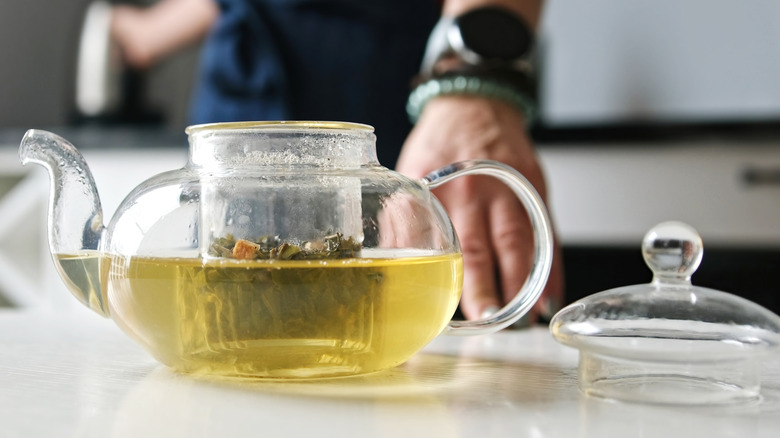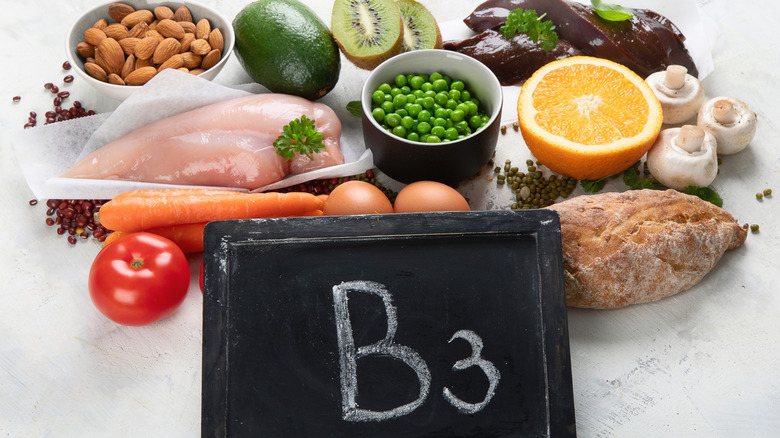This Addition To Your Daily Green Tea May Help Protect Against Alzheimer's
Discovered in 1906, Alzheimer's disease (AD) is a condition that deteriorates the brain, slowly damaging memory, thinking, and behavior, and thus, deeply and inevitably impacting daily life. Affecting about 6 million Americans, the disease is believed to result from the buildup of abnormal proteins called beta-amyloid, which form plaques in the brain, and tangled fibers called tau tangles or neurofibrillary tangles. These plaques and tangles lead to the loss of communication between brain cells, ultimately causing the brain to shrink and leading to dementia, according to the National Institute on Aging (NIA). While scientists have yet to find a cure, evidence suggests that what you eat might play a role in reducing AD's risk and slowing its progression. The NIA explains that some dietary patterns (like the Mediterranean or MIND diets), individual foods, and even supplements might support brain health by fighting inflammation, improving circulation, and protecting brain cells from oxidative stress.
So, if you're wondering what to eat to reduce your Alzheimer's disease risk, you might want to take a closer look at green tea. Green tea is exceptionally rich in antioxidants, particularly a compound known as epigallocatechin gallate (EGCG), which has been linked to numerous brain-protective effects (per Medical News Today). Yet research suggests that this age-old drink might become even more powerful when combined with vitamin B3, an essential vitamin for energy production, which, together with EGCG, might create a synergistic boost for brain protection. While more research is still needed to fully verify the claim, this combo might prove to be a non-pharmaceutical way to keep your mind sharper for longer.
How green tea might protect against Alzheimer's disease
Green tea is more than just a calming ritual or an alternative to coffee. It is a source of powerful antioxidants that might protect your brain against AD. For instance, according to a 2022 review published in Nutrients, EGCG (green tea's star antioxidant against AD) helps reduce the buildup of beta-amyloid, effectively preventing the formation of the dangerous plaques, one of AD's hallmarks. What's more, a 2022 article published in the International Journal of Molecular Sciences found that EGCG might also break down beta-amyloid protein, potentially slowing the disease's progression.
But that's not all when it comes to green tea's unexpected health benefits. According to a 2019 study published in Nutrients, green tea's antioxidants may offer at least three extra brain-protective effects. For starters, they can help scavenge free radicals in the brain, significantly reducing oxidative stress-related damage. Moreover, they might also help reduce inflammatory markers believed to increase AD risk. And last but not least, green tea's antioxidants support healthy blood flow to the brain through their anti-atherosclerotic and anti-thrombotic effects, meaning that they prevent cholesterol buildup and the formation of blood clots.
The power of pairing green tea and vitamin B3
Despite green tea's already remarkable protective effects against AD, a 2025 test-tube study published in GeroScience suggests that combining it with nicotinamide, a form of vitamin B3, could take said effects to a whole new level. Researchers at the University of California, Irvine, explain that the brain's energy reserves naturally decline with age, making it harder to maintain optimal brain health. However, they discovered that a combination of EGCG and this form of vitamin B3 could restore its energy levels to those seen in younger brains, allowing brain cells to regain critical functions such as clearing beta-amyloid plaques. Therefore, pairing green tea with vitamin B3 seems to boost the brain's natural defense mechanism against AD.
Adding this combo to your daily routine doesn't have to be complicated, since niacin is naturally available in foods or can be taken as a supplement. To do so, aim to enjoy three to five cups of green tea with niacin-rich meals or snacks (via Times of India). When planning your meal, focus on adding foods that are high in vitamin B3, such as chicken or turkey breast, salmon, peanuts, avocado, or rice. Alternatively, try taking a vitamin B3 supplement (in nicotinamide form) with your tea. However, make sure to check with your healthcare provider before taking any supplements, especially if you have health conditions or take medication, to avoid possible side effects or interactions. And remember that while this combination may offer some benefits, it's not a cure or a guaranteed way to prevent AD, as more research is still needed.


